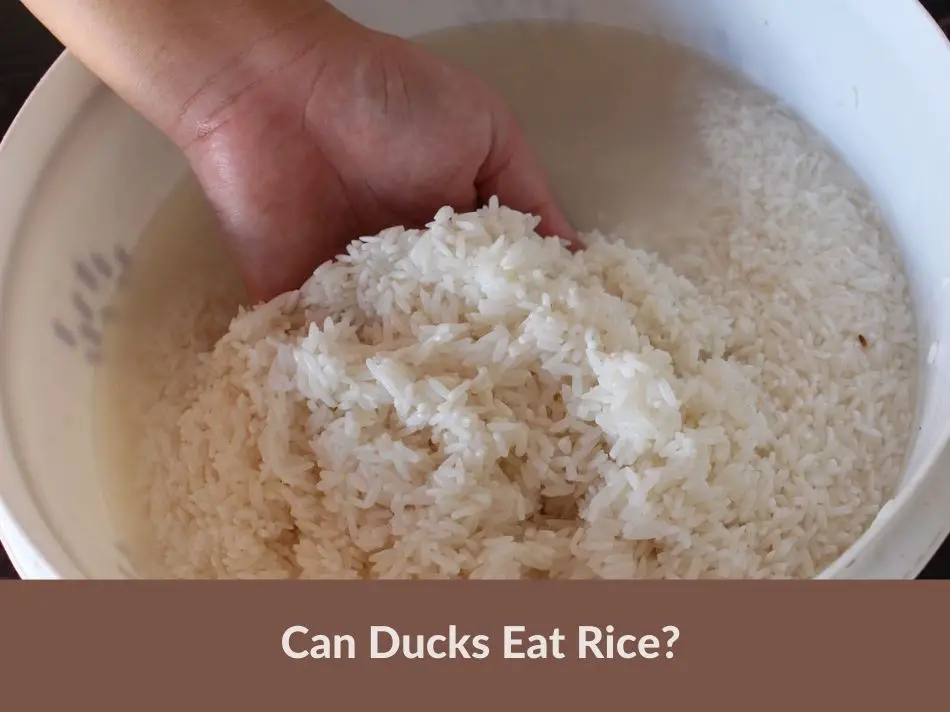Ducks are omnivorous creatures, which means they have a varied diet. In the wild, they feast on a mix of aquatic plants, small fish, insects, and even small amphibians. Domesticated ducks are often fed a balanced diet of waterfowl pellets, grains, and occasional treats. But, can ducks eat rice?
Yes, ducks can eat rice. Rice is a grain, and grains are a natural part of a duck’s diet.
In this article we will talk more about ducks eating cooked and uncooked rice.
Can Ducks Eat Uncooked Rice?
Uncooked rice is not harmful to ducks. The myth that uncooked rice can expand in a bird’s stomach and harm them is just that—a myth. Ducks, with their strong digestive systems, can process uncooked rice without any issues.
But, it’s essential to ensure the rice is clean and free from pesticides or other chemicals.
Can Ducks Eat Cooked Rice?
Duck can surely eat cooked rice. It’s soft, easy to digest, and poses no threat to ducks. When feeding cooked rice to ducks, ensure it’s plain, without any added salt, spices, or sauces. Overly seasoned or flavored rice might contain ingredients that are harmful to ducks.
How Often Can I Feed My Ducks Rice?
While rice can be a delightful treat, it shouldn’t be the primary food source for ducks. Think of rice as an occasional snack. Feeding them once or twice a week in moderate amounts is sufficient. Always ensure they have access to their regular diet and clean water.
Can Ducklings Eat Rice?
Ducklings have more delicate digestive systems than mature ducks. While they can technically eat rice, it’s best to stick to specially formulated duckling feed during their early stages of life. If you do choose to give them rice, ensure it’s cooked and mashed to make it easier for them to consume.
Rice Nutritional Value
Below is the nutritional value of 100 grams white rice.
- Calories: 123
- Protein: 2.9 grams
- Carbs: 30 grams
- Fat: 0.4 grams
- Fiber: 0.9 grams
It also contains several vitamins and minerals as listed below.
- Folate
- Manganese
- Thiamine
- Selenium
- Niacin
- Iron
- Vitamin B6
- Phosphorus
- Copper
- Magnesium
- Zinc
[Source]
Is Rice Healthy for Ducks?
Rice can be a healthy treat for ducks when given in moderation. It provides them with energy and some essential minerals. However, relying solely on rice can lead to nutritional deficiencies. It’s crucial to balance it with other foods that offer proteins, vitamins, and other vital nutrients.
Below are some health benefits from minerals and vitamins that can be found in rice.
- Folate (Vitamin B9): Essential for duckling development, folate aids in DNA synthesis. A deficiency can hinder growth.
- Manganese: Vital for bone formation and metabolism, manganese ensures ducks have ample energy and reduces oxidative stress.
- Thiamine (Vitamin B1): Thiamine helps ducks convert food to energy and supports muscle and heart function. A lack can lead to neurological issues.
- Selenium: An antioxidant, selenium protects duck cells from damage and supports thyroid health, which affects growth and metabolism.
- Niacin (Vitamin B3): Niacin aids digestion and energy conversion in ducks. It’s crucial for skin and nerve health. Deficiency can cause “bow leg” in ducklings.
- Iron: Central to oxygen transport in duck blood, iron deficiency can make a duck appear lethargic with pale-colored skin.
- Vitamin B6: Essential for protein metabolism and neurotransmitter production, Vitamin B6 supports brain development and mood regulation in ducks.
- Phosphorus: Working with calcium, phosphorus strengthens duck bones and teeth. It’s also vital for DNA creation.
- Copper: Needed in small amounts, copper aids in iron absorption, bone formation, and feather pigmentation in ducks.
- Magnesium: A multitasker, magnesium supports muscle function, bone health, and energy production. Ducks lacking it may show tremors.
How To Feed Rice To Ducks
- Choose the Right Rice: Use plain, unseasoned rice. Brown rice is a healthier option as it retains more nutrients than white rice.
- Cooking: If you’re feeding them cooked rice, ensure it’s cooled down before offering it to the ducks.
- Portion Size: A handful of rice for a small flock is sufficient. Remember, it’s a treat, not a meal.
- Clean Up: After feeding, clean up any uneaten rice. This prevents mold growth and keeps the feeding area tidy.
- Water: Always ensure ducks have access to clean water, especially when eating dry foods like uncooked rice.
Other Foods Ducks Can Eat
Ducks love treats and while rice is a healthy treat for them, below are some more for your to choose from.
Want to know more grains and seeds you can feed your ducks? Click here.
Conclusion
Ducks can indeed eat rice, whether it’s cooked or uncooked. However, like all treats, it should be given in moderation and not replace their primary diet. Always prioritize the health and well-being of your feathered friends by providing them with a balanced diet and clean water.
And remember, watching ducks enjoy their treats is one of the simple joys of life!
Disclaimer: The information in this article is for informational purposes only. I'm not an expert or a veterinarian.


